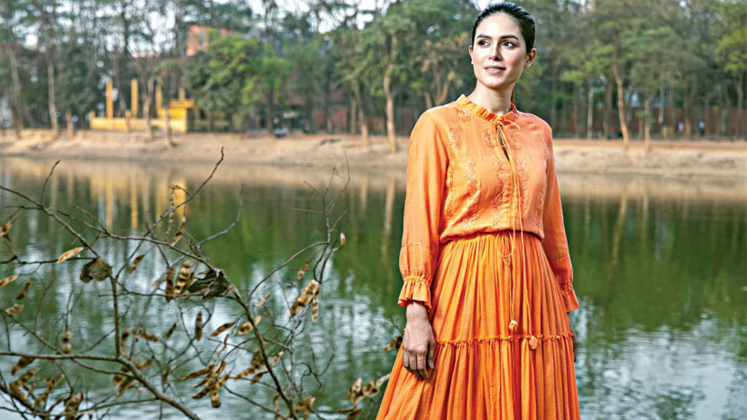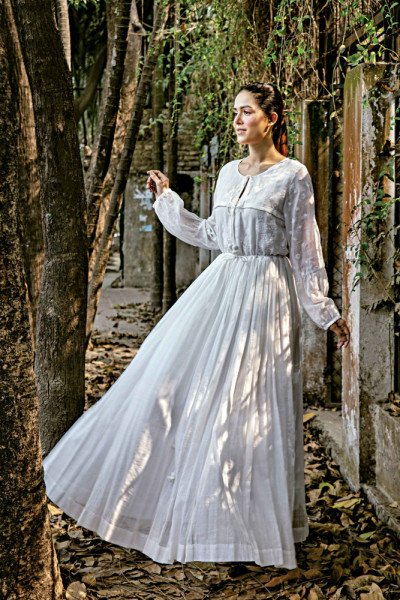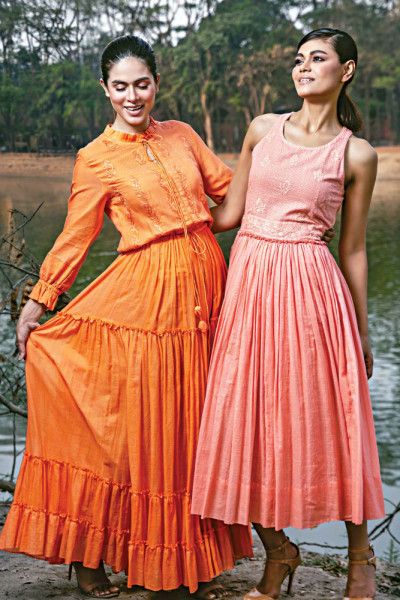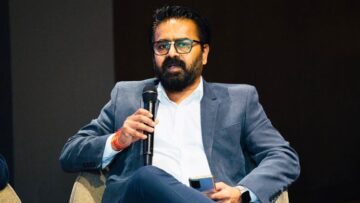Maheen Khan believes that to start afresh, we must be able to go back to our roots and connect the weavers to the end consumers. We must embrace slow fashion, understand what it means and find ways to blend the process into our modern lives. Designer Maheen Khan, better known for her brand Studio Mayasir, had already embraced the age-old system in her creations. However, recently she has completely stopped the retail operations for her fashion outlet to shift focus towards developing lines that have a global acceptance. “We are doing home collections and fashion accessories like scarves, which have a greater international appeal. We are making cushions, runners and even dresses using handloom and handcrafted materials. So basically, today, Studio Mayasir has more of a global essence. Studio Mayasir is influenced by a close cooperation with artisan communities across Bangladesh. It has and hopes to preserve traditional craftsmanship techniques. The collection conveys the desire for simplicity, purity, relaxation, comfort and artisanal luxury,” Maheen Khan mentions.
Starting a new chapter
Studio Mayasir is a renowned design house that has continued to work with handloom setting new standards, where conscious design meets sustainability with empowerment of 2,500 rural underprivileged women in Bangladesh. Here everything is hand-made with the finest natural weaves by trained artisans with contemporary and modern design. “Our focus is on contemporary styles and handcrafted needle work. We believe in fashion in general, but not in the term ‘trendy,’ because we advocate for slow fashion which literally means — timelessness. Our collections are one that you can wear anytime and anywhere and yet look in-sync with the modern-day contemporary look.”
Also Read: Making cotton dyeing an eco-friendly reality
Studio Mayasir’s latest lines have simple designs, simple cuts that are foremost comfortable and minimalistic. “Our designs indirectly resonate to being conscious, responsible and active in promoting a better world,” Khan adds.
Being a part of the industry for over 30 years now, the designer loves to call herself a conservationist and highlights that she is thinking global in everything she is doing today. Be it influencing her students at FDCB or conceptualising her own designs, she is mindful of the craft and wants to add a global touch to everything. This way, she knows that in long-term, the tasteful aesthetics of Bangladesh will never leave the global shores.
Closer to the artisans
“Our crafts are made under fair conditions of wages, working facilities and sustained jobs that keep up our enthusiasm for developing new products every day, with products that offer high standards of quality and functionality. We want our customers to learn about who makes each product, how do they live and how their jobs bring them a better quality of life. We love working with artisans and we love seeing them become entrepreneurs. As slow fashion is the complete opposite of the fast-paced, mill-produced fashion that we commonly see today, it involves the manufacturing of clothes with the help of local artisans and use of eco-friendly materials, with the ultimate goal of preserving our heritage crafts and the environment. It’s a win-win situation for all; our talented artisans get to earn their daily bread and butter, the country gets to preserve its heritage weaves and crafts, and customers get timeless and sophisticated end-products,” Khan highlights.
Even though slow fashion always reigned at the heart of the brand Mayasir and its designing techniques represented the varied aspects of slow fashion, but the designer admits that previously, they occasionally did use some cotton and georgettes which were machine-made, solely because the customers demanded them.
She is fast to admit, “Today, things are different. We have embraced new ways to become a conscious citizen of the world. We have realised that the onus is partly on us to teach our clients the benefits of slow fashion. And if we do not initiate the momentum, then the thought process will only get lost in translation. Someone has to begin the process, no matter how hard the future may be. Today, Studio Mayasir only promotes handloom items that are absolutely local, sustainable and eco-friendly.”
Creating an impact
The designer has taken Mayasir to the Paris Fashion Week, International Weavers Festival in Malaysia and many other major events in Thailand and USA. She has spoken to many buyers and in the process, learnt so much from them. “These shows were certainly an eye-opener for us. Because countries like Indonesia, Malaysia, Cambodia, Laos, Vietnam and India have already invested heavily in slow fashion and have been quite successful in reviving their old techniques of weaving and crafts. This has certainly encouraged us to move forward with the idea. In future, we would probably like to explore the Japanese market because their aesthetics are very much similar to ours. They do a lot of hand-crafted work which is relatable to our stitches, quilts, patterns and lifestyle. Plus, the Japanese value handcrafted work and our weaves. So, it is definitely a good market for the handloom industry of our nation,” she adds.
When talking about her role at FDCB, Maheen Khan mentions that through Fashion Design Council of Bangladesh (FDCB), they are trying to encourage the new-breed of designers to appreciate the Bangladeshi culture. Instead of eyeing embellishments, she wants them to give a modern twist to Jamdani, indigenous peoples’ crafts and handloom, taant, gamcha, lungi, Rajshahi silk, etc. to create a new design language. “Let’s try to rekindle our classy past, our heritage and try to realise what truly is a Bangladeshi cultural DNA. We need to get back to our roots before it is completely lost,” she sums up.










